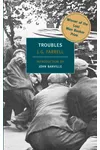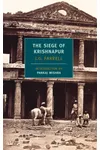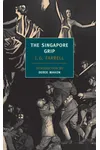Picture a British storyteller who spun tales of empires crumbling with wit and heart—meet J.G. Farrell! Born in Liverpool in 1935, this historical novelist captured the decline of British imperialism in his acclaimed Empire Trilogy. Despite a life marked by polio and a tragic end at 44, Farrell’s sharp prose and unflinching gaze left an indelible mark on literature.
Farrell’s journey wasn’t just about writing; it was about seeing the world through the cracks of history. His novels blend humor, irony, and a keen eye for human folly, making him a standout voice in 20th-century fiction. Ready to dive into his world? Let’s explore the man behind the masterpieces.
The Making of J.G. Farrell
James Gordon Farrell, born to an Irish mother and English father, grew up between Liverpool and Dublin, soaking in the cultural tensions that later shaped his work. After boarding school in Lancashire, he studied French and Spanish at Oxford’s Brasenose College. There, a life-altering blow struck: polio, contracted in 1956, left him partially disabled and confined to an iron lung for months. This brush with mortality fueled his introspective writing, infusing it with themes of fragility and resilience.
After graduating in 1960, Farrell taught at a French lycée, where he began crafting fiction. His early novels, like A Man from Elsewhere (1963), echoed French existentialism, but it was his shift to historical fiction that defined his legacy. A Harkness Fellowship in the U.S. and travels to India sharpened his focus on the British Empire’s unraveling.
J.G. Farrell’s Unforgettable Stories
Farrell’s Empire Trilogy—Troubles (1970), The Siege of Krishnapur (1973), and The Singapore Grip (1978)—is his crowning achievement. Each novel dissects a pivotal moment in British colonial decline with biting satire and vivid storytelling. Troubles, set during Ireland’s War of Independence, follows Major Brendan Archer in a decaying hotel, a metaphor for fading imperial glory. It won the Geoffrey Faber Memorial Prize and, in 2010, the Lost Man Booker Prize.
The Siege of Krishnapur, inspired by the 1857 Indian Rebellion, paints a fictional outpost under siege, exposing the absurdity of colonial arrogance. Its sharp wit and historical depth earned the 1973 Booker Prize, though Farrell stirred controversy by critiquing the sponsor’s Third World business ties in his acceptance speech. The Singapore Grip tackles the fall of Singapore in World War II, blending personal and political narratives with ambitious scope. His unfinished novel, The Hill Station (1981), continued his exploration of British India.
Farrell’s style is a masterclass in balance: comic yet melancholy, detailed yet accessible. His characters, often flawed and caught in history’s tides, reflect the human cost of empire. Critics praise his ability to parody imperial myths while grounding stories in emotional truth, making his work timeless.
Why J.G. Farrell Matters
Farrell’s novels are more than historical fiction; they’re a lens on the hubris and humanity of empire. His Empire Trilogy, lauded as a cornerstone of postcolonial literature, influenced writers like Salman Rushdie, who called him a potential titan of English fiction. His fearless critique of power, paired with his knack for humor, resonates in today’s debates about legacy and identity.
Despite his early death in 1979—drowned while fishing off Ireland’s Bantry Bay—Farrell’s work endures. His novels, reissued by the New York Review of Books, continue to captivate readers, proving his vision transcends time. Farrell’s life, cut short, reminds us to cherish the stories he left behind.
About J.G. Farrell
- Born: January 25, 1935, Liverpool, England
- Key Works: Empire Trilogy (Troubles, The Siege of Krishnapur, The Singapore Grip)
- Awards: 1971 Geoffrey Faber Memorial Prize, 1973 Booker Prize, 2010 Lost Man Booker Prize
- Died: August 11, 1979, Bantry Bay, Ireland
Snag The Siege of Krishnapur and dive into J.G. Farrell’s witty, poignant world of historical fiction!





